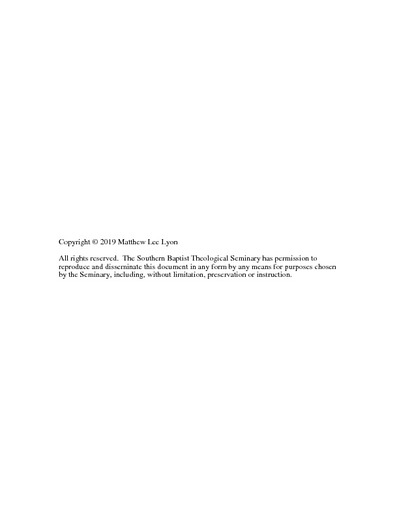| dc.description.abstract | ABSTRACT
JOHN R. RICE AND EVANGELISM: AN ESSENTIAL MARK OF INDEPENDENT BAPTIST FUNDAMENTALISM
Matthew Lee Lyon, Ph.D.
The Southern Baptist Theological Seminary, 2019
Chair: Dr. Thomas J. Nettles
This dissertation examines the theology of John R. Rice through the lens of his commitment to evangelism. Rice was a prominent twentieth-century independent Baptist fundamentalist whose ministry covered many areas, including pastor, newspaper editor, and evangelist. This dissertation argues that evangelism was Rice’s focus and defined his other theological, ministerial, and historical perspectives. Rice’s devotion to evangelism, especially as informed by nineteenth-century revivalism, created a unique form of fundamentalism, one that trumped other doctrines, such as separatism. Chapter 2 places Rice in the context of twentieth-century fundamentalism. Rice developed a unique model, focused on cooperation with all believers for evangelism. It was largely abandoned by his successors. Chapter 3 argues that Rice taught that the Christian life and church should be organized entirely around evangelism, following the heart of Jesus. This approach would naturally produce discipleship and church health. Chapter 4 examines Rice’s bibliology. His conversionism led him away from evidentialist and Common Sense views and toward a Reformed, presuppositional perspective. Chapter 5 demonstrates that Rice was only a nominal dispensationalist. Rice held to the system as far as it facilitated evangelism, but no farther. This stance left Rice on the edges of the typical fundamentalist identification with dispensationalism. Chapter 6 analyzes Rice’s opposition to Arminianism and Calvinism. Rice’s held a superficial understanding of both systems, leading him to make errors in evaluating them, as well past Reformed evangelists. Chapter 7 focuses on Rice’s pneumatology. Rice maintained that evangelism was dependent on a post-conversion enduement of power from the Holy Spirit. Rice’s also strongly opposed the tongues theology of Pentecostalism. Chapter 8 examines Rice’s preaching style in relation to current social issues. Rice advocated pointed preaching against modern social ills, primarily as a means to bring conviction. However, Rice drew most of his analysis from a white, conservative culture, centered around authority, demonstrated by his opposition to the Civil Rights Movement. Chapter 9 focuses on Rice’s methodology of evangelism, which was determined by pragmatism. Rice taught that personal evangelism was the most effective means of evangelism, while mass evangelism was necessary mostly as a means to prepare for evangelism. | en_US |

